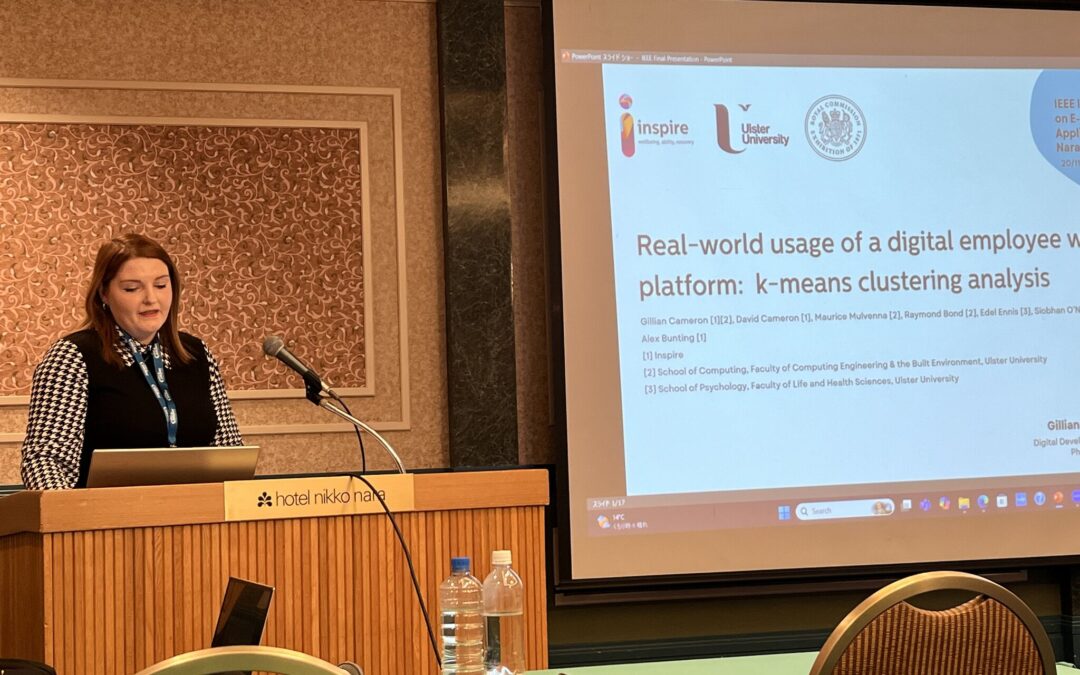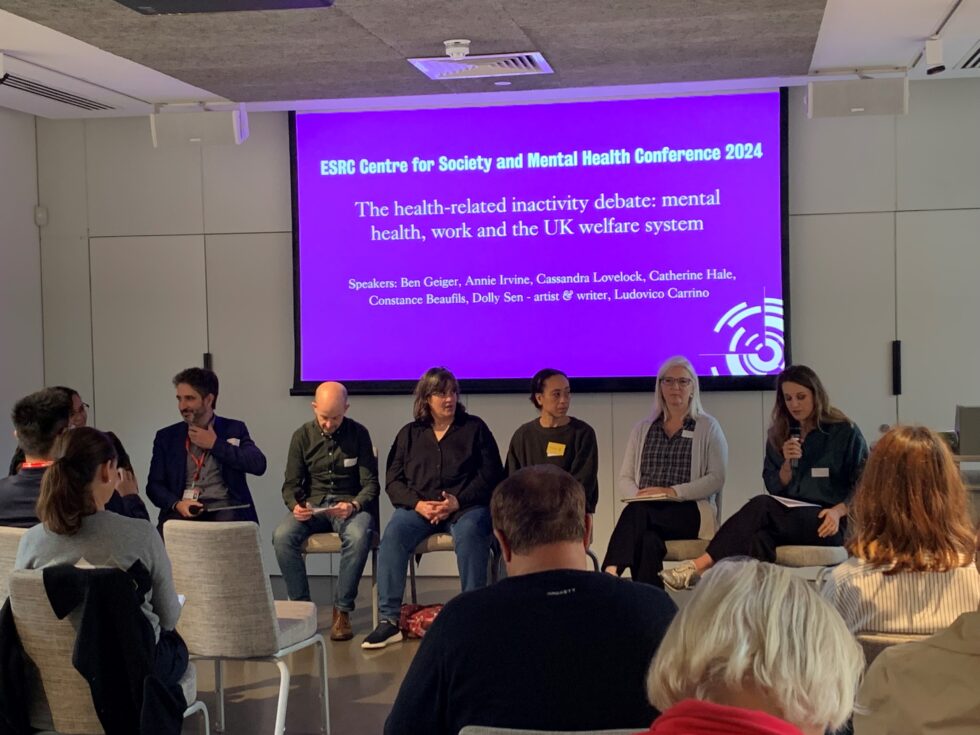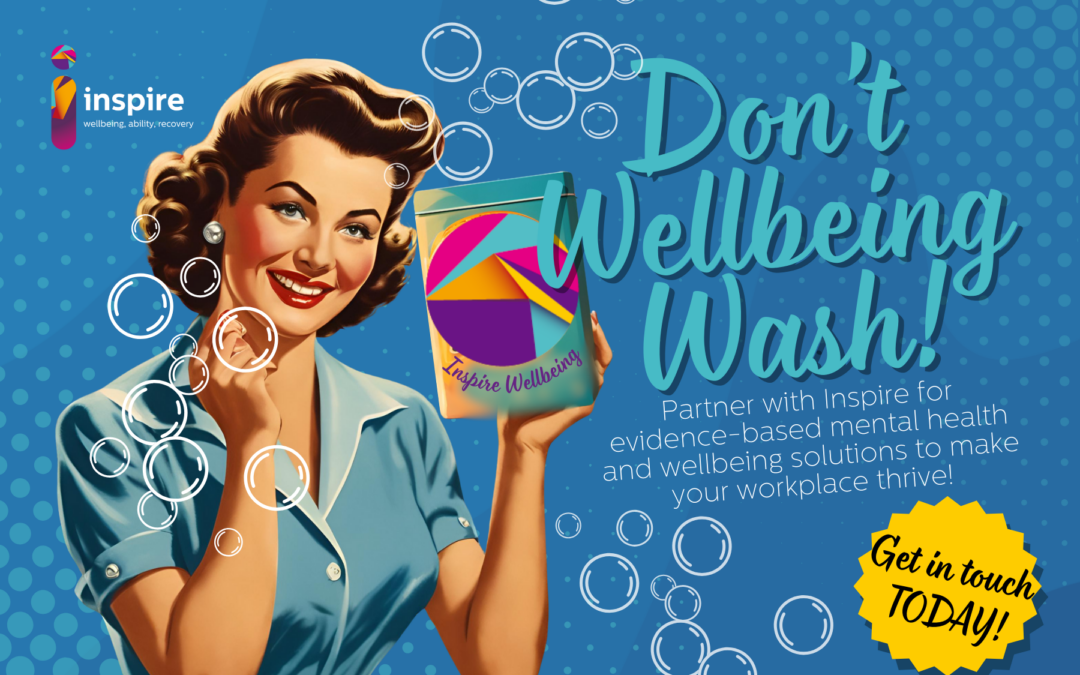
Why wellbeing matters
Prioritising workplace wellbeing helps every aspect of an organisation. These studies, briefings and reports evidence why organisations need to invest in workplace wellbeing.
The World Health Organisation defines healthy, safe and resilient workplaces as those in which people can perform their roles
- without getting sick or injured
- with opportunities to enhance their physical and mental health and social wellbeing
- while preserving harmony with nature and being protected in case of disaster in the community
…For all workers, safe and healthy working environments are not only a fundamental right but are also more likely to improve work performance and productivity, improve staff retention and minimize tension and conflict.
Global and European research, evidence and statistics
Guidelines on mental health at work, World Health Organisation, 2022
Depression and anxiety are estimated to cost the global economy US $1 trillion each year driven predominantly by lost productivity, amounting to an estimated 12 billion working days. The WHO guidelines on mental health at work provide evidence-based recommendations to promote mental health, prevent mental health conditions, and enable people living with mental health conditions to participate and thrive in work. The guidelines on mental health at work aim to improve the implementation of evidence-based interventions for mental health at work.
Recommendations include
- universal interventions that address psychosocial risk factors to reduce emotional distress and improve work-related outcomes
- reasonable work accommodations for team members with mental health conditions
- training workers in mental health literacy and awareness to improve mental health-related knowledge and attitude at work and reduce stigma
- training managers to support workers’ mental health and improve knowledge, attitudes and behaviours for mental health
- providing directed clinical care to people returning to work after absences associated with mental health conditions
Read the full guidelines mental health at work
Mental health at work policy brief, World Health Organisation & International Labour Organisation, 2022
A companion piece to the mental health guidelines, this policy brief provides context for the link between mental health and work.
Key statistics include
- 60% of the world’s population is in work
- 301 million people lived with anxiety in 2019
- 280 million people lived with depression in 2019
- 15% of working-age adults had a mental disorder in 2019
- 50% of the total societal cost of mental health conditions is driven by indirect costs such as reduced productivity
- 12 billion working days are lost every year to depression and anxiety
- Depression and anxiety cost the global economy US$1 trillion a year mostly due to lost productivity
Occupational safety and health in post-pandemic workplaces, EU-OSHA, 2022
This report presents the results of a ‘Flash Eurobarometer – OSH Pulse’ survey commissioned by EU-OSHA with the aim of gaining insights into the state of occupational safety and health (OSH) in post-pandemic workplaces. The agency interviewed a representative sample of more than 27,000 employed workers in April and May 2022 in all EU countries, plus Iceland and Norway. It asked about the mental and physical health stresses workers face and the importance of occupational safety and health measures in their workplace.
Key findings include
- 4 in 10 respondents across the EU agree that their work stress has increased as a result of the COVID-19 pandemic
- 46% of respondents said that they are exposed to severe time pressure or overload of work
- 38% of respondents had access to counselling or psychological support in their workplace
Read the full OSHA occupational safety and health in post pandemic workplaces report
The Return On Investment in workplace mental health programs, Deloitte, 2020
Deloitte’s return on investment (ROI) study is based on analysis of historical investment and savings data from seven Canadian companies at various stages of their mental health investment journey, and complemented by interviews with subject-matter experts and leaders from 10 companies. It examines the typical annual return on investment of workplace mental health programs and identifies leading practices for employers to consider.
Key findings include
- Canadian organisations see positive return on investment. It can take 3 or more years to achieve positive ROI and ROI typically increases as programs mature
- Companies that have mental health programs in place but have not yet achieved a positive ROI may be realizing greater savings than the national average, reducing the cost of doing nothing
- Mental health programs are more likely to achieve positive ROI when they support employees along the entire spectrum of mental health, from promotion of wellbeing to intervention and care, as well as the elimination or reduction of workplace hazards that could psychologically harm an employee
Read the full Return on Investment in workplace mental health programs report
Republic of Ireland research, evidence and statistics
Occupational safety and health in post-pandemic workplaces (Ireland), EU-OSHA, 2022
This survey of 1,008 Irish workers asked about the mental and physical health stresses workers face and the importance of occupational safety and health measures in their workplace.
Key findings include
- 52% of respondents had access to counselling or psychological support through their workplace
- 77% of respondents had access to awareness raising or other activities to provide information on safety and health through their workplace
- 69% of respondents had access to information and training on well-being and coping with stress
- 46% of respondents felt their work stress had increased since the COVID-19 pandemic
- 43% of respondents felt that disclosing a mental health condition would have a negative impact on their career
Read the full occupational safety and health in post pandemic workplace in Ireland report
Healthy Ireland at Work: A National framework for health workplaces in ireland 2021-2025
The Healthy Workplaces Framework is a government strategy to enhance the health and wellbeingof Ireland’s workers. It sets the strategic direction for workplace policies and programmes to enhance the health of workers.
The framework includes some context for health and absenteeism in Ireland’s workplaces citing
- 300,000 days lost in 2016 due to alcohol related absenteeism
- €195 million lost output each year due to alcohol related absenteeism
- €136 million lost output each year due to smoking breaks
The framework’s objectives are to
- build structures and symptoms that support health and wellbeing at government and workplace levels
- raise awareness of the framework through communication and regular reporting on the health of the national workforce
- transform workplace culture and develop guidelines on assessing and transforming organisational cultures to promote health and wellbeing
- support workplaces to enhance workers’ health and wellbeing
Read the full Healthy Workplaces Framework
HR Practices in Ireland, CIPD, 2022
CIPD Ireland provides annual insights into the experiences and concerns of people professionals in Ireland. Respondents identified talent management, people retention and employee engagement as key priorities for the next two years. Respondents identified employee turnover rates as an area of concern with 56% expecting employee turnover to increase. The main reason for turnover was re-evaluation of working life, cited by 69% of respondents.
Key wellbeing trends include
- supporting wellbeing being cited as a challenge of remote or hybrid working by 62% of respondents
- the second most common reason for work absence, after self-isolation and COVID-19 related absences, was work related stress and mental health
- 60% of respondents had counselling and EAP services in place for team members
- wellbeing is on senior leaders’ agenda in 67% of respondents’ organisations
Read the full HR Practices in Ireland report
Ending mental health stigma in the workplace, See Change, 2021
See Change carried out an online omnibus study of 650+ participants to understand the working population’s view towards mental health stigma and gauge the incidence of, and perceptions towards, mental health issues in the workplace
Key messages include
- 1 in 5 workers believe that mental health stigma is prevalent in their workplace
- more than 70% of workers worry that disclosing a mental health issues could impact their job – which can influence low takeup of employee assistance programmes
- 2 in 5 workers have witnessed some form of stigmatising behaviour in the workplace
- 70% of workers believe that a mental health difficulty will make a person behave more negatively
- just over half of workers feel their workplace is eqipped to support employees with mental health issues
- 85% of workers feel it is appropriate to have open conversations about mental health in the workplace
Read the full Ending mental health stigma in the workplace report
Northern Ireland research, evidence and statistics
Mental wellbeing guide for employers , HSENI, 2021
Over 16,000 people in Northern Ireland were reported as suffering from work-related stress in 2018/19. This booklet from the HSE provides a pathway to help employers effectively meet their duty to assess the risks from work to mental health and put in place measures to mitigate this risk.
It recommends that
- Organisations adopt and adhere to formal policies on stress and mental health
- Workplaces offer resources and interventions including time, support systems and skilled assistance including psychological therapies
- Organisations assess the risk and potential causes of stress within workplaces
- Workplaces foster a culture of openness in relation to mental health issues
- Organisations draw up action plans to promote mental wellbeing
Read the full HSE mental wellbeing guide for employers
Working lives northern ireland, CIPD, 2021
CIPD acknowledges that health and wellbeing has shot to the top of policy makers’ and practitioners’ agendas as a result of the COVID-19 pandemic.
Key findings of the report include
- 55% of employees reported a non-physical health condition
- Almost a third of employees felt their work impacts negatively on their mental health
- 45% of employees said they went to work despite not being well enough to do so
- Almost a third of employees always or often felt exhausted at work
- A need for organisations to support line managers to enable them to identify signs of poor wellbeing, poarticularly in hybrid work environments
Read the full Working Lives Northern Ireland report
Mental health status of the NI population in employment: occupations and industries, NISRA, 2021
This study measures the extent of work-related stress, anxiety and depression in Northern Ireland using prescriptions data linked to census data via the Northern Ireland Longitudinal Study.
Key points of the study
- The proportion of the population in employment in receipt of prescription drugs related to anxiety and depression in each year 2010 to 2012 is nearly three times the proportion self-reporting an emotional, psychological or mental health condition according to the 2011 census
- The highest proportion self-reporting an emotional, psychological or mental health condition were found in elementary, sales and customer services occupations
- Personal service occupations had the highest proportion prescribed antidepressants, hypnotics or anxiolytics in each year 2010-2012
Inspire's research, evidence and statistics
Attitudes towards mental health in Northern Ireland, Time to Talk, 2023
- 41% of respondents said they’d find it easier to talk about mental health issues if they had more knowledge and understanding of mental health problems
- 19% of respondents said they’d find it easier to talk about mental health issues if they had better support at work
- 27% of respondents worried they’d be judged or stigmatised if they brought up mental health issues
- Almost 70% of respondents said the cost of living crisis has impacted their mental health
Impact of cost of living increases on mental health, 2022
Inspire asked YouGov to carry out research in September 2022 to understand how the rising cost of living was impacting people’s mental health and their ability to protect their wellbeing.
- 79% of people said the cost-of-living crisis was having a negative impact on their mental health – 29% said the negative impact was significant
- 46% of people had looked for mental health support as a result of worries over the cost of living
- 66% were anxious about their when thinking about their finances over the next 12 months
- 52% said they would find it hard to afford essential items like food, fuel and clothing
- 36% of people said they would find it hard to attend health appointments like dentists or opticians
- 46% of respondents said they would find it hard to meet up with friends and family
- 66% of people said they would find it hard to afford holidays or days out – rising to 74% in households with children
Latest News and Features
With that comes years of knowledge, experience and expertise which we share in our blog, providing updates on the latest developments in mental health and wellbeing and on our innovative services and approaches.
Winter wellbeing 2024
The festive season is here and we’re keen to highlight some wellbeing tips for now and the New Year. Head into 2025 in the best possible frame of mind. Switch off Technology allows us to be constantly connected to colleagues, family and friends. That is often a good thing but…
Reflections on IEEE eHealthCom 2024: Insights, Innovation, and Inspiration in Nara, Japan
Inspire’s Digital Development Lead, Gillian Cameron, reflects on her recent trip to Nara, Japan for the IEEE eHealthCom conference. Last week, I had the privilege of attending and presenting at the IEEE eHealthCom 2024 conference in Nara, Japan. This annual event brings together researchers, industry leaders, and policymakers to discuss…
Mental Health on the Agenda at King’s College London
Inspire’s Policy & Campaigns Office, Matthew Coyle, reflects on his recent trip to King’s College London and the knowledge gained at the ESRC Centre for Society and Mental Health’s annual conference. I had the privilege earlier this month of attending the ESRC Centre for Society and Mental Health’s third annual conference in…
Healthy Organisations Commit to Person-Centred Wellbeing
Employment takes up a good deal of our time. According to the Office of National Statistics, the average UK worker spends over 36 hours in work every week; in Ireland, that figure is 38.5. On World Mental Health Day, understand the effect that wellbeing washing can have on workers and…
On World Mental Health Day, Here’s How to Avoid Wellbeing Washing
As we count down to World Mental Health Day on 10th October, Inspire’s focus is very much on our ‘Don’t Wellbeing Wash’ campaign. Wellbeing washing is similar to green washing, its arguably more infamous cousin. It describes a company or organisational ethos that focus more on the illusion of staff…
World Mental Health Day: Don’t Wellbeing Wash
World Mental Health Day (WMHD), which takes place every year on 10th October, offers us all an opportunity to gather and talk about mental health, demonstrating to everyone that this is a subject worthy of open, honest discussion and explanation. In 2024, Inspire is marking WMHD by highlighting the important issue…
Government Action on Work-Life Balance a Positive Sign
The UK Government has announced plans to introduce new codes of practice for businesses, which are aimed at tackling burnout and codifying a right to switch off. This follows on from Labour’s campaign pledge to empower workers, providing them with the freedom to disconnect from their jobs outside regular hours and…
Line Managers are Key to Workplace Wellbeing
According to new research published by Queen’s University Belfast and the University of Nottingham, strong links exist between positive business performance and mental health training for line managers. Furthermore, the analysis of workforce practices suggests that recognising this, and acting on it, could save organisations millions every year. The study…
CIPD Conference Stresses Authentic, Empathetic Leadership
Inspire\'s Noelle Higgins, Business Development Manager – Therapeutic Services reflects on the recent CIPD conference and research. My colleague Jonathan Cody and I recently took the opportunity to head to the CIPD conference at the RDS, enjoying a day away from our e-mails and catching up with a range of…
Time to celebrate Workplace Wellbeing Day
Workplace Wellbeing Day takes place across Ireland on Friday 26th April and business group Ibec is encouraging employers everywhere to get involved. Workplace Wellbeing Day represents an opportunity for organisations to rebalance and refocus on the things that benefit their employees\' mental, physical and emotional wellbeing. It also provides them…











